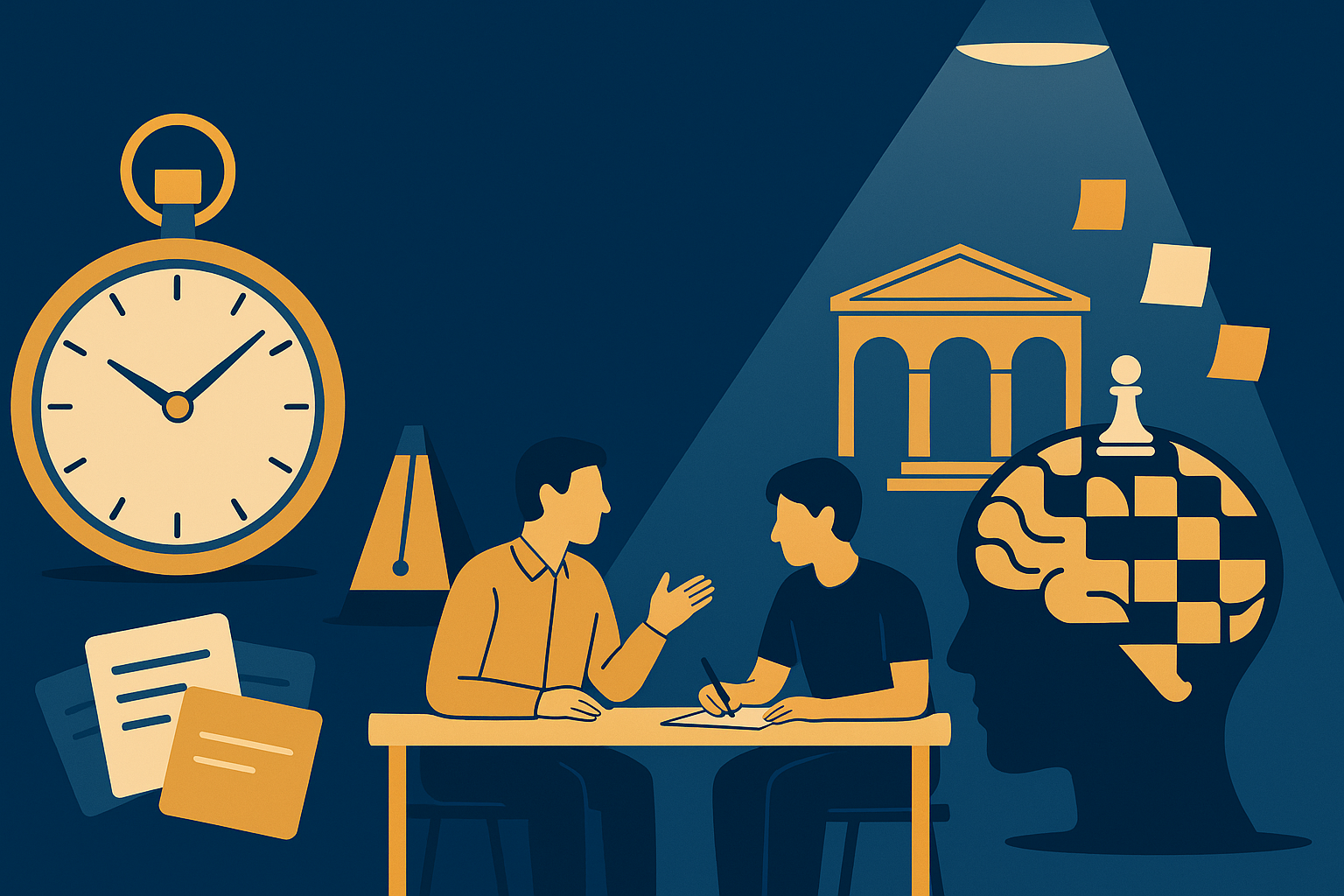



Deliberate practice beats “just studying.” Break skills into tiny parts, set clear goals, practice at the edge of your ability, get rapid feedback, and repeat. That’s how memory champions train (Foer), and how experts are built (Ericsson). A good tutor makes this process simple, focused, and accountable. Intentionality is one of my core values and this article resonates with that value. Like many of you, I really get into books when I first start reading them. “Moonwalking with Einstein” is my latest fascination and I enjoyed a quote from it: “To improve, we must watch ourselves fail, and learn from our mistakes.”
Most test prep looks like this: read a chapter, watch a video, do a big problem set, hope for the best. It feels productive. It isn’t targeted.
Deliberate practice is different. It’s not about time. It’s about specific goals, focused drills, immediate feedback, and relentless refinement.
My perspective on intentionality: I plan sessions by subtraction. Before I begin, I name one win and three things I will not do. Fewer choices. Better focus.
K. Anders Ericsson showed that expert performance grows from deliberate practice: work designed to improve specific aspects of a skill, performed with feedback, and repeated until mastery.
Joshua Foer, in Moonwalking with Einstein, trains like an athlete of memory—using memory palaces, chunking, and purposeful drills to transform average recall into elite performance.
Together they point to one truth: quality of practice drives improvement.
My perspective on intentionality: research gives the map. I still choose the route. I ask, “Which skill moves the needle fastest for me right now?”
A great tutor turns prep into training:
Diagnosis over data-dumps. Pinpoints the single skill holding you back (e.g., algebraic isolation, main-idea inference, comma rules).
Tiny targets. Sets a 20–30 minute drill for one micro-skill, not a 2-hour “everything” session.
Immediate feedback. You hear why you missed it now, not next week.
Designed difficulty. Work sits just beyond your comfort zone. Not too easy. Not impossible.
Accountability. You track results, reflect, then raise the bar.
Reading a chapter can inform you. Tutoring trains you.
My perspective on intentionality: I treat the tutor as a coach and a mirror. I show up with a question, a log, and a decision: “If X is still weak, we double down. If not, we advance.”
Define the micro-skill.
“SAT Reading → Inference questions with abstract answer choices.”
Set a measurable target.
“10-question set at 80%+ accuracy within 12 minutes.”
Design a focused drill.
Use only the question type you’re training. Reduce distractions. Timer on.
Get rapid feedback.
Check each item immediately. Name the exact error (misread, vocab gap, wrong rule, rushed evidence).
Reflect → adjust → repeat.
Log patterns. Tweak your strategy. Run another short set with one new constraint.
My perspective on intentionality: I add a pre-commitment: “If I miss two for the same reason, I pause and rewrite my rule card before the next question.”
00:00–03:00 Target + plan (what micro-skill, what success looks like).
03:00–18:00 Drill (timed, single skill, 8–12 reps).
18:00–26:00 Feedback loop (check each item; label error types; correct with reasoning).
26:00–30:00 Reflection (one sentence strategy, one metric, next-step drill).
My perspective on intentionality: I run two switches—Start ritual (phone out of room, timer, goal card on desk) and Stop signal (timer ends → pen down → reflect). Rituals prevent drift.
Drill: 10 inference items pulled from past exams only.
Process: Read question stem first → skim passage for claim → underline evidence → predict → then compare choices.
Goal: ≥80% accuracy, average 70–90 seconds per question.
Tutor’s role: Model one item out loud; watch you do two; interrupt the moment your process drifts.
My intentionality note: I highlight the warrant that links evidence to the answer. If I can’t state it, I don’t click it.
Drill: 12 problems where the slope/intercept is symbolic.
Process: Write the rule you’re testing (e.g., “slope = rate; intercept = initial value”) before solving.
Goal: Zero algebra slips for 3 sessions in a row.
Tutor’s role: Force unit checks and “talk-through” reasoning on every step.
My intentionality note: I say the units aloud. It slows me down just enough to prevent silent errors.
Drill: 5 problems, each with a diagram you must draw from scratch.
Process: Identify variable, write general formula first, then differentiate implicitly.
Goal: No missing units, no plugging numbers before differentiating.
Tutor’s role: Pause you at setup; ask “What’s changing? What’s constant?”
My intentionality note: I label constants in a different color. One glance keeps me from treating them as variables later.
Memory palace: Place formulas, vocab, or historical details in vivid locations in a familiar space.
Chunking: Group small facts into meaningful clusters (dates → events → themes).
Dual-coding: Pair images with verbal rules. Your brain loves pictures.
Speed → accuracy loops: Short sprints, then slow perfect reps.
My perspective on intentionality: I assign “addresses” to ideas before I study them. If a fact doesn’t have a home in my palace, I don’t move on.
Weekly cadence
2 × 60-minute tutor sessions = diagnosis + modeling + feedback.
3 × 30-minute solo drills = repetition with tracking.
1 × 30-minute review = error themes + strategy update.
Tracking sheet (columns)
Date | Skill | Drill | Score/Time | # Careless | # Concept | New Rule | Next Drill
Difficulty ladder
Level 1: Untimed, open notes
Level 2: Timed, single skill
Level 3: Mixed set, exam time
Level 4: Full section, exam conditions
Climb only when you hit your target twice in a row.
My perspective on intentionality: I schedule practice like classes—same time, same place. If it’s not on the calendar, it doesn’t exist.
What is today’s single win?
What will I ignore today? (name three)
Which constraint keeps me honest? (timer, no phone, scratch-work rule)
Where will the new knowledge live? (memory palace spot, rule card, journal)
What is my stop signal and reflection question?
Marathon study sessions with no defined skill.
Checking answers only at the end.
Re-doing the same problem without naming the error.
Jumping to full tests before your micro-skills are stable.
“I got it wrong because I’m bad at math/reading.” That’s not a diagnosis.
My perspective on intentionality: I ban identity stories. I replace them with process stories: “I misread modifiers. My new rule is underlining them.”
Parents: Ask, “What micro-skill are you training today?” not “How long did you study?”
Teachers: Turn homework into tiny mastery drills; give same-day feedback.
Administrators: Build schedules that allow short, focused practice blocks and tutoring cycles.
My perspective on intentionality: Communities shape attention. When classrooms and homes protect short, deep work, scores rise and stress falls.
Download: a one-page Deliberate Practice Log (columns above).
Try: one 30-minute session today.
Partner: book a tutor who will diagnose, design drills, and hold you accountable.
Ericsson, K. A., Krampe, R. T., & Tesch-Römer, C. (1993). The role of deliberate practice in the acquisition of expert performance. Psychological Review, 100(3), 363–406.
Ericsson, K. A., & Pool, R. (2016). Peak: Secrets from the New Science of Expertise. Houghton Mifflin Harcourt.
Foer, J. (2011). Moonwalking with Einstein: The Art and Science of Remembering Everything. Penguin Press.
Roediger, H. L., & Karpicke, J. D. (2006). Test-enhanced learning: Taking memory tests improves long-term retention. Psychological Science, 17(3), 249–255.
Share this: